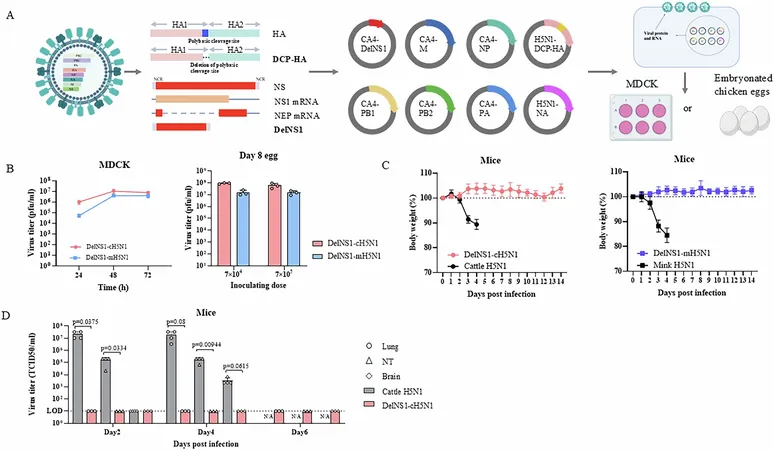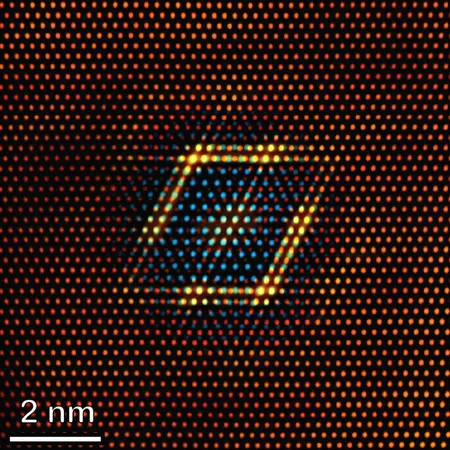
Scientists Innovate with Nasal Spray H5N1 Avian Influenza Vaccine – A Game Changer in Pandemic Preparedness!
2025-04-03
Author: Arjun
Introduction
In a groundbreaking achievement, the State Key Laboratory for Emerging Infectious Diseases at the University of Hong Kong (HKU) and the InnoHK Center for Virology, Vaccinology and Therapeutics (CVVT) have unveiled a pioneering nasal spray vaccine for H5N1 avian influenza.
Development of the Vaccine
This innovative vaccine is based on an influenza virus vector platform and its development is detailed in a recent publication in Nature Communications.
Background on Nasal Spray Platform
This nasal spray platform gained attention during the early days of the COVID-19 pandemic when collaboration with Wantai BioPharm in mainland China led to the swift creation of a nasal spray COVID-19 vaccine.
Following promising results in Phase 1-3 clinical trials, the vaccine made history in 2022 as the world’s first approved nasal spray vaccine for COVID-19.
Need for Pandemic Preparedness
As the dust settles from the COVID-19 crisis—one of the darkest periods for global health—the importance of being prepared for future pandemics cannot be overstated.
The World Health Organization (WHO) and several countries are actively strategizing for a possible pandemic scenario presented by "Disease X."
H5N1 Avian Influenza Concerns
The H5N1 avian influenza, first identified in humans in Hong Kong back in 1997, has long caused global concern due to its potential to leap from birds to humans, resulting in numerous variants and cross-species infections.
Alarmingly, since early 2024, there have been uncontrolled outbreaks of H5N1 in U.S. dairy farms, with multiple human infections linked to the virus spreading in cattle and other livestock.
Genetic Surveillance and Government Response
Recent genetic surveillance has revealed concerning mutations that enhance the virus's ability to infect human upper respiratory cells, signaling an urgent need for enhanced pandemic readiness.
In response, the U.S. government has pledged a hefty $500 million to pharmaceutical companies to spearhead mRNA-based vaccine developments specifically targeting H5N1.
Limitations of Current Vaccines
What the COVID-19 pandemic taught us is that swift access to safe and effective vaccines is crucial in combating viral threats.
Current vaccines—including mRNA options—are effective in preventing severe illness and death but are less effective in curtailing transmission.
This gap is primarily due to the traditional intramuscular delivery route, which triggers robust systemic antibodies but insufficient immune response in the upper respiratory tract where viruses typically enter.
Advantages of the Nasal Spray Vaccine
Many conventional vaccines also require multiple doses for optimal efficacy.
Enter the revolutionary nasal spray vaccine: a single-dose solution that could transform outbreak responses by swiftly activating mucosal immunity at the site of viral entry.
Research Outcomes
In a race against the clock to tackle the looming H5N1 threat, the HKU and CVVT research team has utilized their nasal spray platform to craft a nasal spray H5N1 avian influenza vaccine.
Early animal studies indicate a highly favorable safety profile, showcasing its ability to elicit comprehensive immune responses—neutralizing antibodies, T-cell activation, and mucosal immunity in the upper respiratory tract.
Conclusion
Could this innovative approach to vaccination signal a new era of pandemic preparedness? As we navigate the complex landscape of infectious diseases, one thing is clear: a potent and effective nasal spray vaccine could be our best defense yet against the next viral outbreak!




 Brasil (PT)
Brasil (PT)
 Canada (EN)
Canada (EN)
 Chile (ES)
Chile (ES)
 Česko (CS)
Česko (CS)
 대한민국 (KO)
대한민국 (KO)
 España (ES)
España (ES)
 France (FR)
France (FR)
 Hong Kong (EN)
Hong Kong (EN)
 Italia (IT)
Italia (IT)
 日本 (JA)
日本 (JA)
 Magyarország (HU)
Magyarország (HU)
 Norge (NO)
Norge (NO)
 Polska (PL)
Polska (PL)
 Schweiz (DE)
Schweiz (DE)
 Singapore (EN)
Singapore (EN)
 Sverige (SV)
Sverige (SV)
 Suomi (FI)
Suomi (FI)
 Türkiye (TR)
Türkiye (TR)
 الإمارات العربية المتحدة (AR)
الإمارات العربية المتحدة (AR)